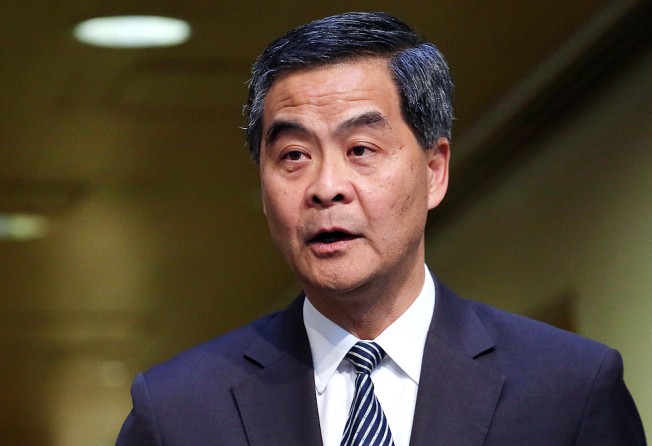Who is the biggest loser after rejection of 2017 electoral reform proposal?
All sides lost when the reform plan was rejected, but calls for the city to put aside politics look like wishful thinking, says Gary Cheung

The failure of government officials, pan-democrats and the pro-establishment camp to reach a consensus on political reform culminated in the expected rebuff of the government proposal for the 2017 chief executive election. Ironically, they all agree on one thing: all sides are losers in the failure to attain universal suffrage.
Ronny Tong Ka-wah, a moderate pan-democratic lawmaker who has been advocating dialogue between Beijing and his camp, said on Wednesday that all the people of Hong Kong would be losers if Legco rejected the proposal.
His views were similar to those of Chief Secretary Carrie Lam Cheng Yuet-ngor, who said in April everyone would lose if the proposal was voted down. She warned the community would be further split and governance would be adversely affected.
Dr Ray Yep Kin-man, a professor with City University's department of public policy, said the rejection was a slap in the face for the central government, whose promise of "one man, one vote" in 2017 had failed to be realised.
"On the other hand, the pan-democrats can neither move Hong Kong's political system forward nor tell the public the way forward after voting down the package," he said.
But it is beyond doubt that moderate pan-democrats will emerge as the biggest losers after their attempts to find common ground with Beijing proved to be in vain. All compromise proposals put forward by moderates for the 2017 poll, including former chief secretary Anson Chan Fang On-sang's Hong Kong 2020 and a team of 18 liberal-minded academics, were rejected by Beijing.
The proposals by the two groups were among those that attempted to mollify Beijing by omitting the idea of having candidates nominated by the public, an idea dismissed by Beijing as inconsistent with the Basic Law.
"The moderate pan-democrats will be in a more difficult position after the failure of the political reform as hardliners were gaining ground in both pro-government and pan-democratic camp," Yep said.
But Yep, who teamed up with Tong and other moderates to set up the think tank Path of Democracy early this month, believes there is a need for middle-of-the-road members to heal the rift between Beijing and pan-democrats in the post-reform era. "I still believe Beijing wants to resolve the governance problem in Hong Kong," the academic said.
Chief Executive Leung Chun-ying said yesterday he hoped the community would now put aside their differences and forge consensus on economic, social and livelihood issues in the next two years.
A mainland official handling Hong Kong affairs said both the central government and Hong Kong governments hoped society would focus on economic and livelihood issues after the reform blueprint was voted down.
"There is still a need to facilitate democratic development in Hong Kong, but it should not cause an adverse impact on economic and social development," the official said. "Hong Kong has spent more than a decade in the debate on political reform and missed many opportunities in economic development."
But brushing aside the issue of political reform is easier said than done.
Dr Ma Ngok, head of Chinese University's department of government and public administration, said the legitimacy crisis facing the Leung administration would get worse after the rejection of the reform proposal.
"The government will face greater challenges in implementing initiatives on livelihood issues given its flagging popularity and credibility," he said. "It would be wishful thinking for the government to believe that it can ignore political issues."
In his closing remarks in the debate on the reform package, Secretary for Constitutional and Mainland Affairs Raymond Tam Chi-yuen said communication and trust between Beijing and pan-democrats were a prerequisite for successful implementation of universal suffrage.
"If these are not done properly, I'm afraid conditions will not be ripe for relaunching the five-step process for political reform," he said.
Basic Law Committee member Albert Chen Hung-yee said the political reform failed because of the huge gap between Beijing and the pan-democrats on the kind of universal suffrage to be introduced.
But Hong Kong 2020 said this was not the time for the government to abandon all efforts on constitutional reform.
"It is important to establish an effective channel of communications between Beijing officials and pan-democrats," it said.
A spokesman for the European Union Office to Hong Kong and Macau said the EU expressed its continuing support for the introduction of universal suffrage for electing the chief executive.
"Following the 18 June vote … the EU calls on all parties to engage in constructive discussions with a view to an early resumption of the electoral reform process," the spokesman said.
Some political and business leaders, including former chief executive Tung Chee-hwa, have warned that Beijing's trust in Hong Kong would be undermined and its support for the city's economic development would not be as easily assumed as in the past if the reform was voted down.
But a senior Hong Kong official dismissed this warning, saying that the central government would continue to introduce measures that were mutually beneficial to Hong Kong and the mainland.
"The central government gave the green light to the launch of the Shanghai-Hong Kong Stock Connect scheme in November when the Occupy Central protests were still under way," the Hong Kong official said.
"I don't see the rejection of the reform proposal will affect the Hong Kong and Shenzhen stock market 'through train' scheme."